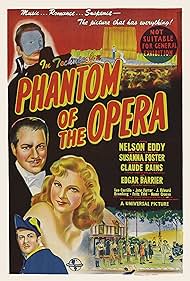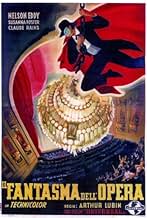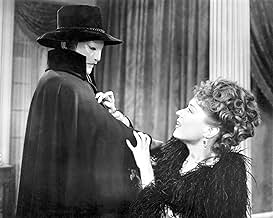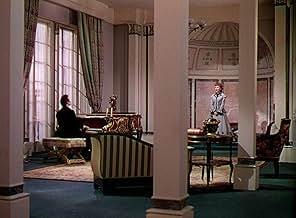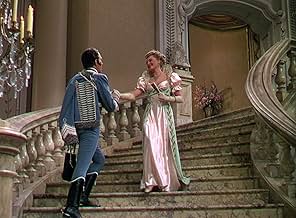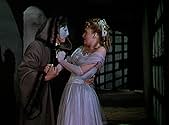IMDb RATING
6.4/10
8.9K
YOUR RATING
An acid-scarred composer rises from the Paris sewers to boost his favorite opera understudy's career.An acid-scarred composer rises from the Paris sewers to boost his favorite opera understudy's career.An acid-scarred composer rises from the Paris sewers to boost his favorite opera understudy's career.
- Won 2 Oscars
- 3 wins & 5 nominations total
Kate Drain Lawson
- Landlady
- (as Kate Lawson)
Featured reviews
Before writing a film article on Claude Rains for CLASSIC IMAGES (December 2000), I took another look at 'Phantom' to appraise his performance. He's one of those rare actors who can make you feel sympathy when he plays the ill-treated violinist so that you understand why he turns into 'The Phantom'. His performance is just one asset of this handsome technicolor adaptation of the famous story. Why carp about the changes made for this version? It stands on its own as an entertaining melodrama studded with operatic sequences that give it added dimension. Nelson Eddy has never been in better voice and Susanna Foster is certainly up to the demands of her singing role. The comic aspects of the story are a bit overdone and the only weakness of the film is giving Eddy and Edgar Barrier silly routines as they compete for the hand of Foster. Aside from that, this can still be enjoyed as a horror story set against the Paris Opera background. The sets are rich and detailed. Understandably, the film won Academy Awards for color cinematography and color art direction. Edward Ward's haunting score was also nominated and contributes greatly to the overall enjoyment of the film. The horror is muted in this version--but the rich musical highlights are a compensation. Absorbing entertainment.
When Universal decided to remake Lon Chaney's classic silent version of the opera, sound opened up a rather obvious vista for the film. We can make it as much about opera as the phantom haunting the Paris Opera.
A task rendered considerably easier by the presence of Nelson Eddy and Susanne Foster. Unlike his screen partner at MGM, Jeanette MacDonald, Nelson Eddy came from the opera to the cinema. He always viewed himself as a singer first, films were something he did to get publicity for his concert tours. But Eddy always loved the grand opera, it could easily been his career path. Consequently The Phantom of the Opera and the arias he sings here always had a special place in his affections. We see a lot of the real Nelson here.
Another one of his interests was sculpture. The bust of Susanna Foster that Claude Rains stole from Eddy's dressing room is something that Nelson Eddy actually did. Sculpting was a hobby of his and as you can see he was quite good at it. Might have made a living doing that as well.
Susanna Foster who had a lovely soprano voice gave up her career soon after this most acclaimed of her films. A pity too, it was a real loss to the screen.
This Phantom of the Opera has a bit of comedy in it as well. Baritone Nelson Eddy and Inspector of the Surete Edgar Barrier have an uneasy rivalry going for the affections of Foster. The scenes involving this are nicely staged by director Arthur Lubin, more known for doing Abbott and Costello comedies.
This may have been Edgar Barrier's best film role. He was a more than competent player, his career probably suffering because he was a bit too much like Warren William who was himself a poor man's John Barrymore. Barrier played equally well as villains or as a good guy as he is here. Another fine role for him even though he only has one scene is in Cyrano de Bergerac where he plays the very sly and all knowing and discerning Cardinal Richelieu.
Of course Phantom of the Opera is really made by the performance of Claude Rains as the mild mannered, inoffensive Eric Claudin, a violinist in the Paris Opera who is crushing out big time on Susanna Foster. We see him first being told after 20 years he's being given the sack by the company. What they describe sounds an awful lot like Carpel Tunnel Syndrome that he's developed which is affecting his playing the violin. Bad news for Susanna Foster also because he's been her secret benefactor in paying for voice lessons.
There isn't any middle aged man who doesn't identify with Rains. Tossed out of his job, the rent due, crushing out big time on a young girl, a lot of us have been there. Then when he thinks an unscrupulous music publisher is stealing a concerto he's written, he loses it completely and kills him. And when acid is thrown in his face disfiguring him, it's a short journey to madness.
Rains really makes us feel for Claudin. In that sense the film is not a horror picture in that we're dealing with monsters or unworldly creatures that Universal so specialized in. The man who becomes the Phantom is all too real, too human, and if we're pushed right, could be any one of us.
Can you do better than opera arias by Nelson Eddy and a classic performance by Claude Rains? I think not.
A task rendered considerably easier by the presence of Nelson Eddy and Susanne Foster. Unlike his screen partner at MGM, Jeanette MacDonald, Nelson Eddy came from the opera to the cinema. He always viewed himself as a singer first, films were something he did to get publicity for his concert tours. But Eddy always loved the grand opera, it could easily been his career path. Consequently The Phantom of the Opera and the arias he sings here always had a special place in his affections. We see a lot of the real Nelson here.
Another one of his interests was sculpture. The bust of Susanna Foster that Claude Rains stole from Eddy's dressing room is something that Nelson Eddy actually did. Sculpting was a hobby of his and as you can see he was quite good at it. Might have made a living doing that as well.
Susanna Foster who had a lovely soprano voice gave up her career soon after this most acclaimed of her films. A pity too, it was a real loss to the screen.
This Phantom of the Opera has a bit of comedy in it as well. Baritone Nelson Eddy and Inspector of the Surete Edgar Barrier have an uneasy rivalry going for the affections of Foster. The scenes involving this are nicely staged by director Arthur Lubin, more known for doing Abbott and Costello comedies.
This may have been Edgar Barrier's best film role. He was a more than competent player, his career probably suffering because he was a bit too much like Warren William who was himself a poor man's John Barrymore. Barrier played equally well as villains or as a good guy as he is here. Another fine role for him even though he only has one scene is in Cyrano de Bergerac where he plays the very sly and all knowing and discerning Cardinal Richelieu.
Of course Phantom of the Opera is really made by the performance of Claude Rains as the mild mannered, inoffensive Eric Claudin, a violinist in the Paris Opera who is crushing out big time on Susanna Foster. We see him first being told after 20 years he's being given the sack by the company. What they describe sounds an awful lot like Carpel Tunnel Syndrome that he's developed which is affecting his playing the violin. Bad news for Susanna Foster also because he's been her secret benefactor in paying for voice lessons.
There isn't any middle aged man who doesn't identify with Rains. Tossed out of his job, the rent due, crushing out big time on a young girl, a lot of us have been there. Then when he thinks an unscrupulous music publisher is stealing a concerto he's written, he loses it completely and kills him. And when acid is thrown in his face disfiguring him, it's a short journey to madness.
Rains really makes us feel for Claudin. In that sense the film is not a horror picture in that we're dealing with monsters or unworldly creatures that Universal so specialized in. The man who becomes the Phantom is all too real, too human, and if we're pushed right, could be any one of us.
Can you do better than opera arias by Nelson Eddy and a classic performance by Claude Rains? I think not.
The Phantom Of The Opera is a 1943 adaptation of the classic novel of the same name, directed by Arthur Lubin and starring Claude Rains, Susanna Foster and Nelson Eddy.
I think I'm not alone when I say that the best part of this film is the gorgeous and colorful cinematography and beautiful sets and costumes which make this a visually outstanding film however aside from this I think it is very forgettable.
The acting is OK and that's really it, even Claude Rains, one of the greatest actors of all time isn't particularly memourable in this film. I'm also not the biggest fan of the movie's tone, it just feels too light hearted and almost goofy, ruining most of the suspense, at least for me.
6.8/10
The splendor of Technicolor and the lavish opera sequences distinguish this version of the famous story. While this version bears little resemblance to the original, it does feature a first-rate performance by Claude Rains, in the title role. It certainly employs the best production values of any filmed version, and provides for high entertainment. Recommended.
Gaston Leroux's penny-dreadful novel was hardly the stuff of great literature, but it did manage to tap into the public consciousness with its gas-light-Gothic tale of a beautiful singer menaced by a horrific yet seductive serial killer lurking in the forgotten basement labyrinths of the Paris Opera. Lon Chaney's silent classic kept the basic elements of the novel intact--and proved one of the great box office hits of its day, a fact that prompted Universal Studios to contemplate a remake throughout most of the 1930s.
Although several proposals were considered (including one intended to feature Deanna Durbin, who despised the idea and derailed the project with a flat refusal), it wasn't until 1943 that a remake reached the screen. And when it did, it was an eye-popping Technicolor extravaganza, all talking, all singing, and dancing. The Phantom had gone musical.
In many respects this version of PHANTOM anticipates the popular Andrew Lloyd Webber stage musical, for whereas the Chaney version presented the Phantom as a truly sinister entity, this adaptation presents the character as one more sinned against than sinning--an idea that would color almost every later adaptation, and Webber's most particularly so. But it also shifts the focus of the story away from the title character, who is here really more of a supporting character than anything else. The focus is on Paris Opera star Christine Dae, played by Susanna Foster. In this version Christine is not only adored by the Phantom; she is also romantically pursued by two suitors who put aside their differences to protect her.
Directed by Universal workhorse Arthur Lubin, this version is truly eye-popping as only a 1940s Technicolor spectacular could be: the color is intensely brilliant, and Lubin makes the most of it by focusing most of his camera-time on the stage of the Paris Opera itself and splashing one operatic performance after another throughout the film. But in terms of actual story interest, the film is only so-so. Susanna Foster had a great singing voice, but she did not have a memorable screen presence, and while the supporting cast (which includes Nelson Eddy, Edgar Barrier, Leo Carrillo, and Jane Farrar) is solid enough they lack excitement. And the pace of the film often seems a bit slow, sometimes to the point of clunkiness.
The saving grace of the film--in addition to the aforementioned photography, which won an Oscar--is Claude Rains. A great artist, Rains did not make the mistake of copying Chaney, and although the script robs the Phantom of his most fearsome aspects, Rains fills the role with subtle menace that is wonderful to behold, completely transcending the film's slow pace, the lackluster script, and "sanitized for your protection" tone so typical of Universal Studios in the 1940s. Unless you're a die-hard Phantom fan you're likely to be unimpressed.
Gary F. Taylor, aka GFT, Amazon Reviewer
Although several proposals were considered (including one intended to feature Deanna Durbin, who despised the idea and derailed the project with a flat refusal), it wasn't until 1943 that a remake reached the screen. And when it did, it was an eye-popping Technicolor extravaganza, all talking, all singing, and dancing. The Phantom had gone musical.
In many respects this version of PHANTOM anticipates the popular Andrew Lloyd Webber stage musical, for whereas the Chaney version presented the Phantom as a truly sinister entity, this adaptation presents the character as one more sinned against than sinning--an idea that would color almost every later adaptation, and Webber's most particularly so. But it also shifts the focus of the story away from the title character, who is here really more of a supporting character than anything else. The focus is on Paris Opera star Christine Dae, played by Susanna Foster. In this version Christine is not only adored by the Phantom; she is also romantically pursued by two suitors who put aside their differences to protect her.
Directed by Universal workhorse Arthur Lubin, this version is truly eye-popping as only a 1940s Technicolor spectacular could be: the color is intensely brilliant, and Lubin makes the most of it by focusing most of his camera-time on the stage of the Paris Opera itself and splashing one operatic performance after another throughout the film. But in terms of actual story interest, the film is only so-so. Susanna Foster had a great singing voice, but she did not have a memorable screen presence, and while the supporting cast (which includes Nelson Eddy, Edgar Barrier, Leo Carrillo, and Jane Farrar) is solid enough they lack excitement. And the pace of the film often seems a bit slow, sometimes to the point of clunkiness.
The saving grace of the film--in addition to the aforementioned photography, which won an Oscar--is Claude Rains. A great artist, Rains did not make the mistake of copying Chaney, and although the script robs the Phantom of his most fearsome aspects, Rains fills the role with subtle menace that is wonderful to behold, completely transcending the film's slow pace, the lackluster script, and "sanitized for your protection" tone so typical of Universal Studios in the 1940s. Unless you're a die-hard Phantom fan you're likely to be unimpressed.
Gary F. Taylor, aka GFT, Amazon Reviewer
Did you know
- TriviaThe original script revealed Claudin to be Christine's father, who abandoned her and her mother in order to pursue a musical career. When this was excised from the final film, it left Claudin's obsession with Christine unexplained.
- GoofsWhen Christine takes the mask off from Phantom's face, we see that his scar reaches the low area of his right cheek, even the right eyelid is slightly fallen. But before that during the entire film, we never see a single mark of the scar on the uncovered area of the Phantom's face, not even the fallen eyelid through the mask.
- Quotes
[Christine has left Raoul and Anatole in her dressing room while she greets a crowd of admirers]
Raoul D'Aubert: Would you join me for a bit of supper at the Cafe de l'Opera?
Anatole Garron: With pleasure, monsieur.
Raoul D'Aubert: Think we can get through this crowd?
Anatole Garron: Certainly. After all, who'd pay any attention to a baritone and a detective?
- ConnectionsFeatured in Weirdo with Wadman: Phantom of the Opera (1964)
- SoundtracksLULLABY OF THE BELLS
(uncredited)
Written by Edward Ward
Lyrics George Waggner
Sung by Susanna Foster and Nelson Eddy
- How long is Phantom of the Opera?Powered by Alexa
Details
Box office
- Budget
- $1,500,000 (estimated)
- Runtime1 hour 32 minutes
- Sound mix
- Aspect ratio
- 1.37 : 1
Contribute to this page
Suggest an edit or add missing content

